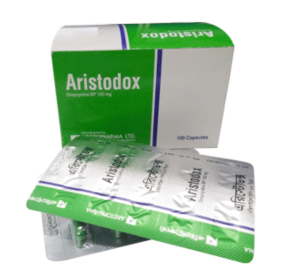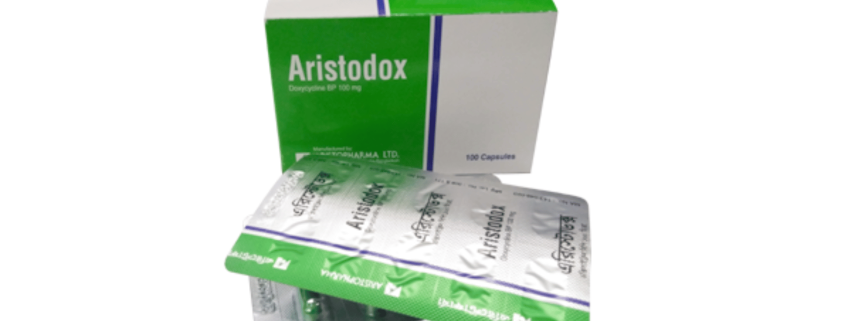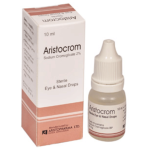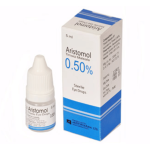Aristodox (Doxycycline)

Therapeutic Group : Antibiotic
Presentation:
Aristodox Capsule: Each capsule contains Doxycycline Hyclate BP equivalent to Doxycycline 100 mg.
Pharmacology:
Doxycycline inhibits bacterial protein synthesis by binding to the 30S ribosomal subunit.
Indications:
Aristodox is clinically effective in the treatment of a variety of infections caused by a wide range of Gram-negative and Gram-positive bacteria, as well as certain other microorganisms; such as-
Pneumonia: Aristodox is effective against single and multilobe pneumonia and broncho-pneumonia caused by susceptible strains of H. influenzae, Klebsiella pneumoniae, Pneumococci and other Streptococcus species, Staphylococcus and Mycoplasma pneumoniae.
Different respiratory tract infections: Bronchitis, tonsillitis, pharyngitis, otitis media and sinusitis, due to susceptible strains of pneumococci, H. influenzae, Staphylococcus species and Betahaemolytic streptococci.
Others: Genito-urinary tract infections, Gasto-intestinal infections, Ophthalmic infections, Soft tissue infections, Acne vulgaris and Acne conglobata.
Dosage & Administration:
Adults: The usual dose of oral Doxycycline is 2 capsules at a time on the first day of treatment or administered 1 capsule Doxycycline every 12 hours followed by a maintenance dose of 1 capsule/day.
In the management of more severe infections (particularly chronic infections of the urinary tract), 1 capsule every 12 hours is recommended.
For children above eight years of age: The recommended dosage schedule for children weighing 45 kg or less: 4.4 mg/kg on the first day followed by 2.2 mg/kg daily.
Acute gonococcal urethritis: 1 capsule twice daily for 2-4 days in male and until a cure has been obtained in female.
Chlamydial infections: 1 capsule twice daily for 7 days. Syphilis: 1 capsule twice daily for 14 days.
Contrainidications:
It is contraindicated in persons who have shown hypersensitivity to any of the tetracyclines.
Warning & Precautions:
The use of Doxycycline during tooth development (last half of pregnancy, infancy and childhood to the age of 8 years) may cause permanent discoloration of the teeth (yellow-gray-brown). Photosensitivity manifested by an exaggerated sunburn reaction has been observed in some individuals taking Doxycycline. Limit sun exposure.
Overgrowth of non-susceptible organisms, including fungi, may occur. Re¬evaluate therapy if superinfection occurs.
Side effects:
Anorexia, nausea, vomiting, diarrhea, skin rash, photosensitivity, urticaria and hemolytic anemia.
– Patients who are on anticoagulant therapy may require downward adjustment of their anticoagulant dosage
– Avoid coadministration of tetracyclines with penicillin
– Absorption of Doxycycline is impaired by antacids containing aluminum, calcium or magnesium, bismuth subsalicylate and iron-containing preparations
– Barbiturates, carbamazepine and phenytoin decrease the half-life of Doxycycline.
Use in special groups:
Pregnancy: There are no adequate and well-controlled studies on the use of doxycycline in pregnant women. Should be avoided during pregnancy. Use in Lactation: Doxycycline is excreted in human milk. Use of Doxycycline during nursing should be avoided if possible.
Neonates and children: Doxycycline may cause permanent discoloration of the teeth (yellow-gray-brown) and so is contraindicated for neonates and children under 8 years.
Elderly: No special precautions are necessary in the elderly.
Storage:
Store below 30°C in a dry place and protect from light. n Keep out of the rich of children.
Packing:
Aristodox Capsule: Each box contains 100 Capsules in blister pack.



